Octopus: The Cursed Genius of The Ocean
Mammals are definitely the dominant species on land due to their physical and cognitive abilities. But the paths of evolution on land and under water are very different, therefore in the depths of the sea we can meet animals, which (theoretically) could become masters of the planet instead of humans. And this time, it's the guys not from our team (not mammals), the true geniuses of the ocean - Octopuses.
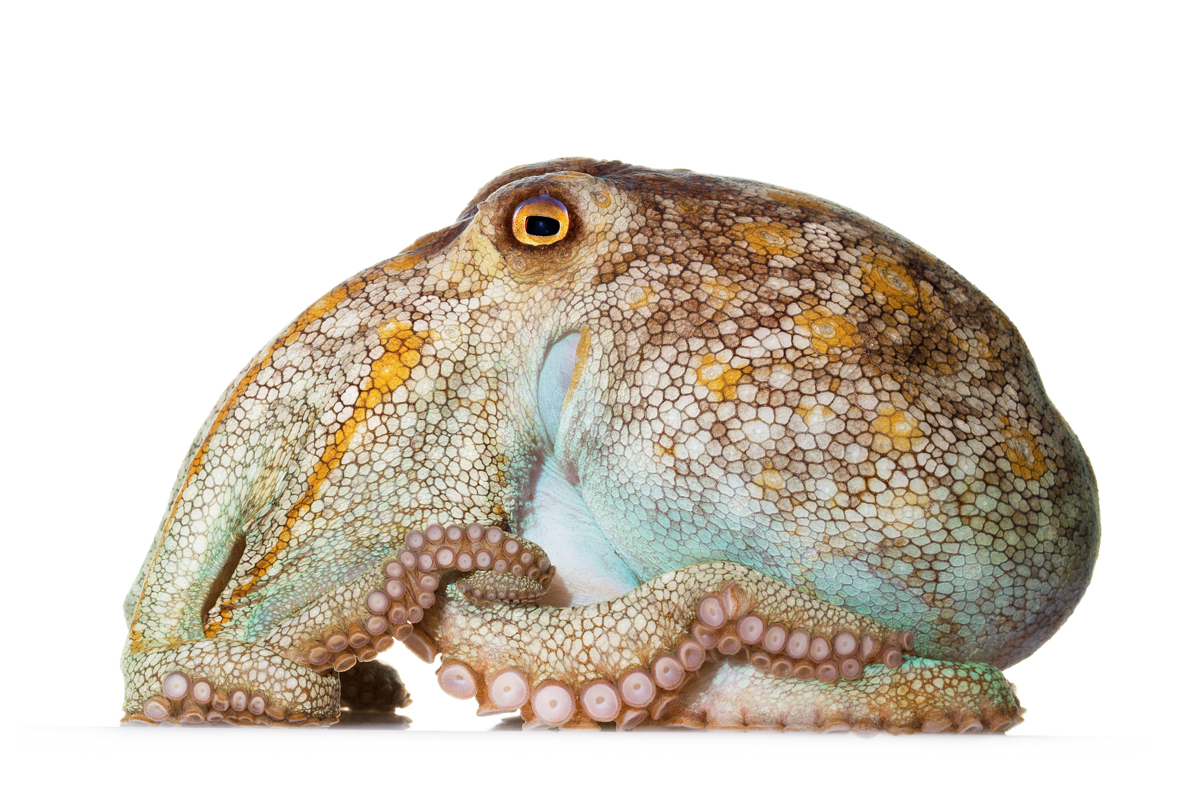
Octopus pallidus. image source
Although most mollusks, such as slugs, snails and crustaceans, have a relatively simple nervous system and body, cephalopods, and especially octopuses, have evolved into something much more sophisticated. Their physiology claims the title of most surprising on the Earth, if they are from our planet at all.
Physiological Features
Modern octopuses are very diverse. Among the 300 species you can meet giant representatives, with a length of tentacles up to 2 meters, or tiny creatures, whose mass does not exceed 30 grams. Squid and cuttlefish belong to the same class, but distinguished by the presence of 10 tentacles, which they use not so functional.
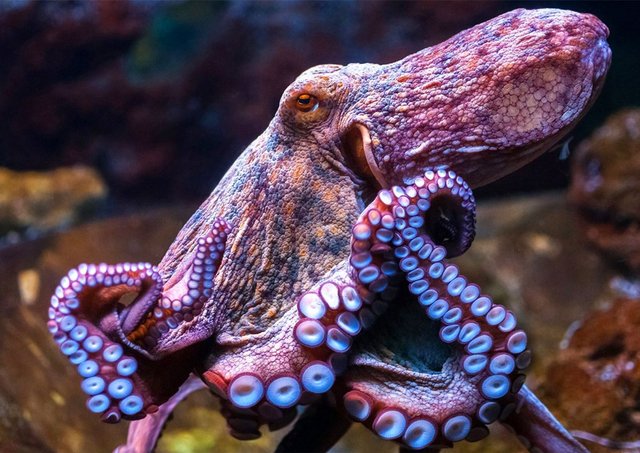
We will examine the physiology and skills that is characteristic of most species of octopus, regardless of their habitat and size.
500 million years ago, the predecessors of cephalopods declined from shells in favour of freedom of movement. The result of this "solution" was the complete absence of bones and cartilage to increase the flexibility and maneuverability of the body. Octopus is able to take almost any shape and to fit through a hole the size of ¼ of the size of his body.
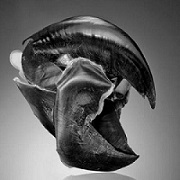
Humans are proud of their hands, especially with the thumb, which allows us to implement functionality not available to most animals. But even under the control of such a perfect brain, our hands are clumsy sticks, compared to the tentacles of an octopus.

image source
Each octopus tentacle is a separate, complex, multi-functional biological tool that works independently from the adjacent limbs. Because there are no bones, the tentacle can bend in any angle and can take any form.
Sensitive suction cups located along the tentacles, in a sense, can be compare with our fingers. On average each tentacle have at 240 suction cups, it turns out that octopus has 1800 fingers on the 8 hands.
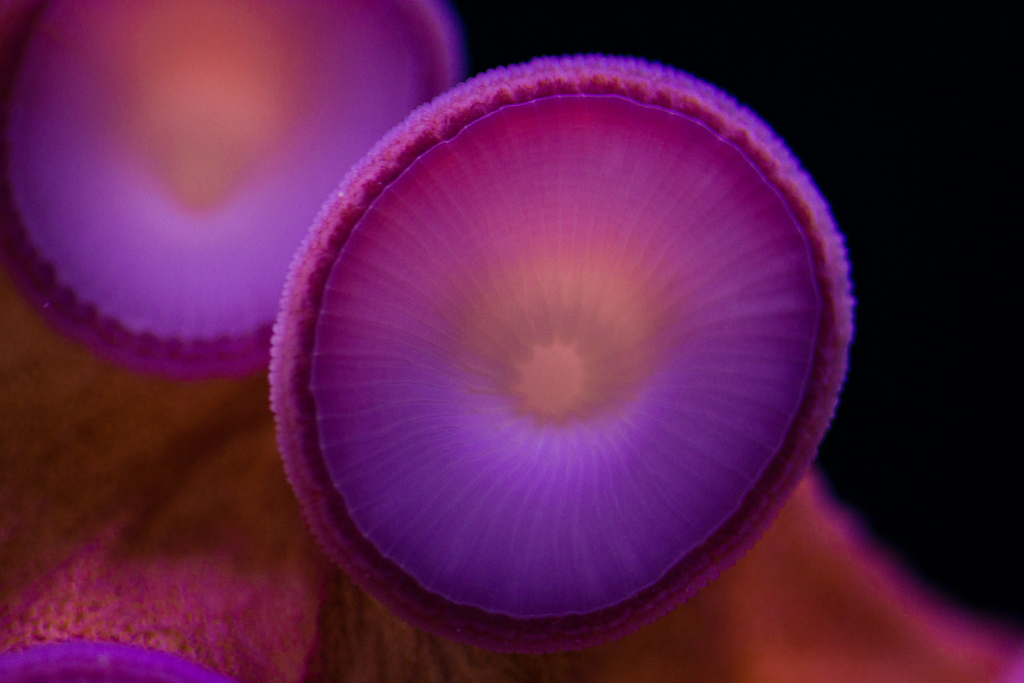
image source
Each of these suckers can also move independently from the others. These features allow to octopuses easily manipulate the surroundings, open cans and use surrounding objects as protection.
On each suction сup located about 700-1000 receptors. (For comparison: the human finger contains a only 241 sensitive receptors per square centimeter). Receptors on the suction cups don't just transmit tactile data, but also recognize chemical substances, and allow the octopus to determine the taste and smell of objects. Just imagine that your fingers work just like your mouth.
source
In addition to the scanning of the environment, the suction cups are the main weapon of the octopus while hunting. Suction cup with a diameter of 2mm can hold 45 grams, and a diameter of 6mm almost 170 grams of weight. Thus, an adult octopus of medium size can create a holding force of 8 kg on one tentacle, i.e. physically able to pull even big animals.
In a sense, the body of the octopus is one giant muscle, which occupies 90% of body entire mass. Such structure of the body requires a constant influx of a large amount of fresh blood, enriched with oxygen. That's why nature endowed the octopus with three hearts! Two of the hearts responsible for delivering blood into the tentacles, the third supplies blood to all other vital organs, located in the head.
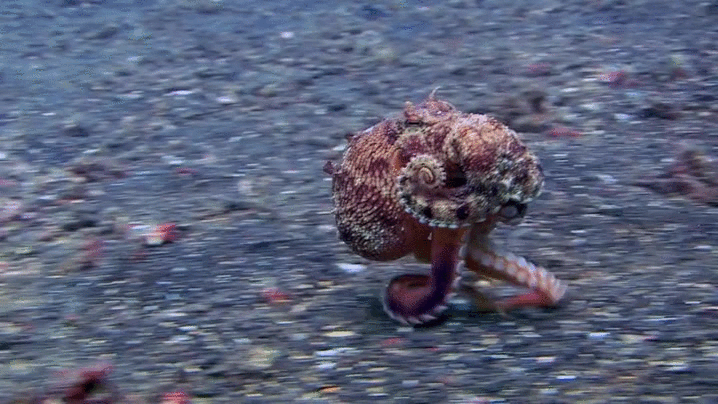
source
During swimming, the work of the third heart stops, to increase blood flow to muscles. Therefore, octopuses prefer to crawl, or move with underwater currents.
Octopus, like other cephalopods, has the blue blood. The main oxygen carrier in the blood of these animals is hemocyanin, which contains not iron, as our hemoglobin, but copper. Hemocyanin carries less oxygen (another reason why the octopus minimizes movements). But at the same time makes the blood more viscous, and prevents it from freezing at low temperatures at great depths and in Arctic waters.
However, the ocean is full of dangerous predators, for whom the octopus is a highly nutritious treat. Therefore, in addition to the ability to use surrounding objects as a defense, the octopus has one of the most advanced built-in mechanisms of masking.
This is one of the few animals, which can use mimicry and camouflage simultaneously. The octopus is capable to create three-dimensional images of nearby objects on the move, pretending to be algae, corals or other animals. The speed and accuracy of his transformation is striking.
To change the color the octopus uses special reflectors and pigments (yellow, brown and red colors), which are located inside special bags in the upper layer of the skin. The animal squeezes the muscles around the bags, pushing reflectors and pigments out. Depending on the frequency and strength of the muscular affect, the bags change their size, thus changing the color.
The reflectors are somewhat similar to a soap bubble that shimmers with rainbow colors, they eliminate the restriction on the color monotony of pigments. As a result, the octopus is able to reproduce any color and pattern.
But that's not all. Using the specific muscle groups, the octopus can change the texture of his skin, make it completely smooth or to grow thorns, to accurately reproduce the desired object. In combination with a flexible body, his ability to mimicry has practically no boundaries.
It is worth noting an interesting fact. Octopus eyes are almost identical to human eyes in their structure. There is only one major difference: the retina in the eye of the octopus is located outside the eye, not inside, as we have. However, this does not prevent the octopus to have a three-dimensional vision and to focus. No marine animal has such perfect eyes as an octopus. Only the eyes of owls, cats and humans can compete with them.
image source
Even more curiously, that octopus has black-white vision. Scientists for a long time could not understand how the octopus chooses a color while masking. It turned out that the above-described reflectors don't just change color, but also have special receptors that catch the light reflection from the nearest objects. Even the skin of the octopus constantly scans the surrounding space!

So the squid sees the surrounding space. The octopus sees about the same. source
And the last bastion of protection - poisonous ink cloud. The common octopus can put "smokescreen" six times in a row, and after half an hour already completely restores all expended ink. If he will not fast enough to leave his own ink stain, he may die.
So, let's put together all the amazing physiological abilities of these cephalopods:
- 8 tentacles (hands) are able to bend in any direction and move independently from each other. The body without bones takes any shape.
- 240 suction cups on each tentacle, each of which moves independently of the others. Each suction cup is equipped with receptors that transmit data about the chemical composition of objects.
- 3 hearts are responsible for the delivery of blood into the tentacles and internal organs. The third heart disables during movement.
- Mimicry and camouflage. The ability to change the color of the skin, its structure, and copy almost any object.
- Intricate eye close to the human. With the function of focusing and filtering of light. Three-dimensional black-white vision.
- Full control over every muscle in the body, up to the regulation of the muscles around the microscopic dermal bags.
It is obvious that such a serious functionality requires a very powerful CPU to process all the incoming data and perform complex commands. Prepare to be amazed even more. Next stop: the nervous system of octopuses.
Nervous System
Conventional freshwater snails have about 10.000 neurons, lobsters - almost 100.000, jumping spiders- 600.000. Bees and cockroaches, who are pretty “difficult” insects, have about 1 million neurons. The nervous system of the octopus has 500 million neurons!
Compare this number with the mammals: usual mice- 80 million neurons. Rats, who are the social animals, can boast a total of 200 million neurons. Cats and dogs have moved in this direction further, and their nervous system in total consists of approximately 700 million neurons. The nervous system of an octopus in its potential close to the nervous systems of our Pets!
But, the nervous system of octopus differs significantly from the usual for us the Central Nervous System. In mammals, most of the neurons (40-50%) are located directly in cerebrum. While the octopus has 2/3 of all nerve cells located directly in the tentacles.

image source
In the central brain accounts for only 10% of neurons, another 30% is distributed between the optic lobes, the remaining 60% are in the ganglia of the limbs and functioning almost independently. In fact, the octopus has the most decentralized nervous system and his hands are able to think for themselves. Most of the sensory information from the suction cups is processed directly in the ganglia.
Just imagine: when you open the jar, your brain gives accurate signals to the muscles of the arms, focusing on the signals of the senses (vision, tactile sensation). The octopus acts quite differently. His central brain sends only one simple command: hunt | search | explore. The tentacle finds a crab that hid in the shelter, and itself "decides" how exactly to get it.
The octopus doesn't even have to see the target, the tentacles do all the work, processing the signals in ganglia and deciding how to proceed. The arms can cope with complicated manipulation, receiving only General guidance from the center. That's why the tentacle of an octopus, even severed from the body, is able consciously to move and even dodge the danger.
Exaggerated example: imagine that your hands are writing an article on Steemit, while the head is reading another article. Both these processes do not interfere with each other.
The process of hunting looks very interesting: octopus spreads tentacles around his body, covering 360 degrees. Each tentacle scans strictly allotted a sector without interfering with adjacent. If one of the tentacles finds a prey or an interesting object, two neighbors immediately rush to help him.
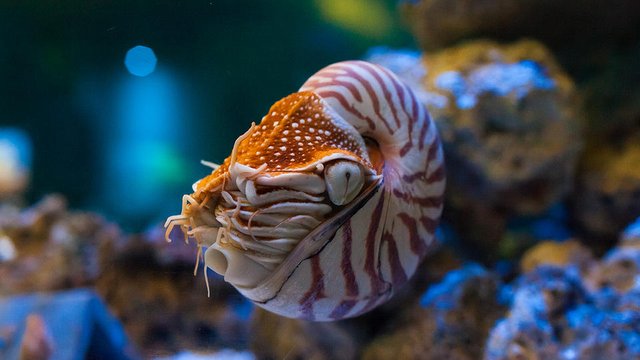
Nautilus- an ancient relative of modern octopus, which has survived to the present day. From the point of view of evolution, this is a monkey, who never descended from the trees.
The development of such a complex and unique nervous system is a consequence of a flexible and vulnerable body. A difficult environment, a varied diet, the need to hide from predators and to navigate the terrain (among the corals), limbs without restrictions- this is what led to the formation of a decentralized management system, which allows the animal to efficiently respond to any signals.
Octopuses can manipulate objects, easily open the shells of mollusks, unscrew the covers from jars, and even to disassemble the water filtration system in aquaria. Thus, they surpass all underwater inhabitants. The dolphins are very clever too, but they are severely limited by their body anatomy, therefore, cannot be considered worthy competitors.
A logical question arises: Do octopuses have intelligence? After all, they are quite a bit inferior to the cats and dogs in the number of neurons. And as we know our Pets are able to recognize the intonation of speech, have memories and are susceptible to training.
Cognitive abilities
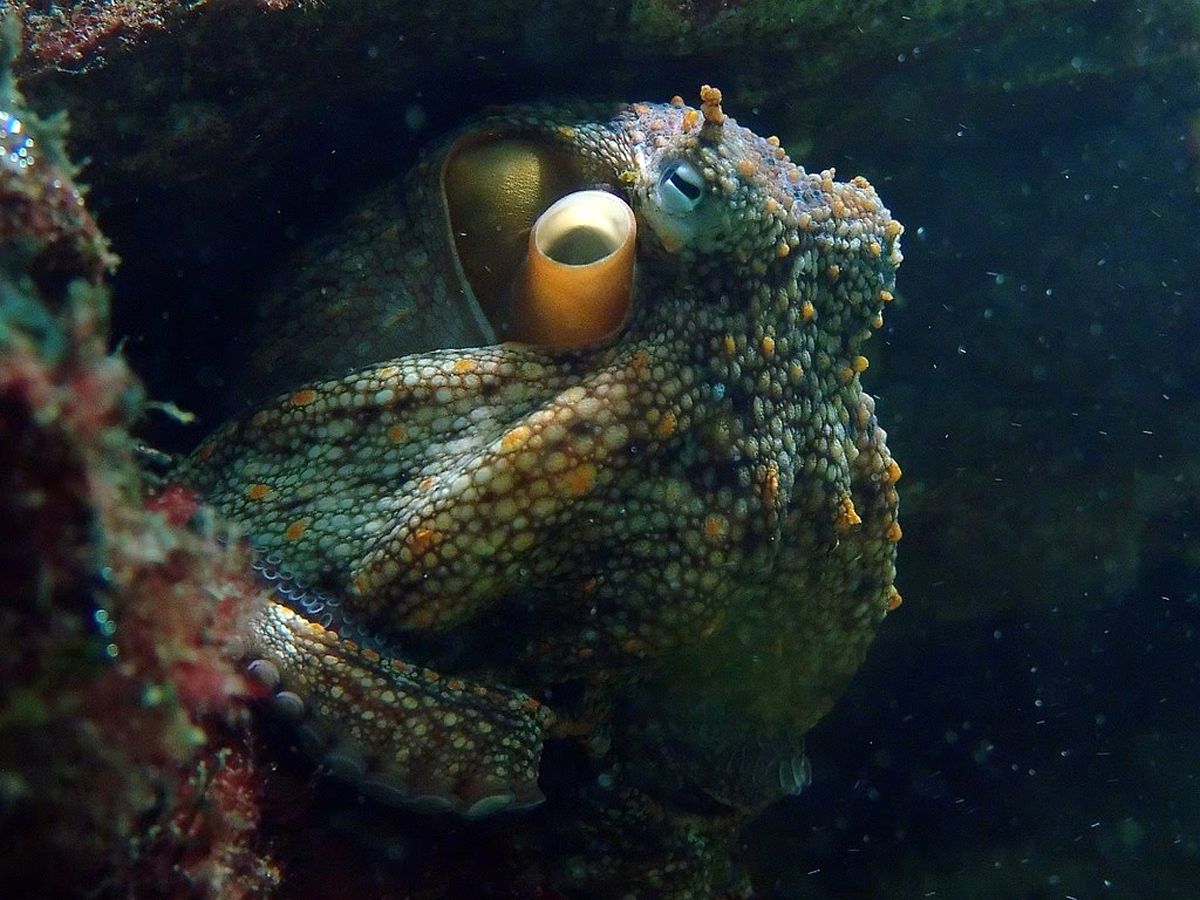 image source
image sourceIt is difficult to apply to the octopus standard evaluation criteria on the presence of intelligence, for example, the ability to use tools. After all, his main tool is his hands. There is no need to make something to get food from hard to reach places, his tentacles will cope with tasks inaccessible even to humans without special tools.
However, a number of observations of their behavior and the laboratory tests prove, that these guys definitely know and understand more than we think.

Professor Roy L. Caldwell and Jennifer Mather for a long time watching these amazing cephalopods in natural and artificial habitats, and described many curious instances of their behavior, like many other scientists and employees of the aquariums. Some of these stories:
The male octopus escaped from his aquarium through the water supply pipe to a nearby aquarium with a female, for mating. During the day he could stay in her aquarium, masquerading under the ground to avoid being seen by people. The female wasn't hiding. This is a trick.
Coconut octopuses move with coconut shells for protection. The key point is that they carry around halves of coconut, and do not use the place where the coconut was found. I.e. they understand that the coconut will need them in the future. This is planning.
Sometimes octopuses can direct the flow of water on the subject (Lego, empty bottles, bottle cap), so it went back under the influence of the water flow entering the aquarium. Another octopus constantly catching tube, which float on the surface of the aquarium and released it back, watching its ascent. It's a playing.
In one of the tests, the researchers used multi-colored cubes that octopus had to put in a certain order to get food. Another octopus from the neighboring aquarium constantly was watching this process. When a week later he got the multi-colored cubes in the first time, he immediately put them in the correct order. Training through observation.
In the New Zealand aquarium, a pair of octopuses have learned to blow water into the bulbs, thereby causing a short circuit and turn off the light. All octopuses are aware that they are in prison, that there is "inside" and "outside". They are able to realize the results of their actions on the interrelated dimensions.
At the Seattle aquarium in the experiment with two caretakers, one of them fed octopuses treats, and the other poked in them bristly rod. Over time, with the appearance of the "evil" caretaker, octopuses shot him with water jets. I.e. they are able to distinguish between individuals, even in the same uniform.
They can pass through labyrinths. Can distinguish familiar places with visual marks and choose the best way to get to the reward. At the same time, they clearly understand when they are under observation. In the aquarium of Seattle, one of octopuses refused to perform any tasks, when scientists observed him.
Thus, we can say that octopuses show unique character traits, know how to play, able to plan their actions and have a good memory. They are able of quickly learning only by observing, and use the surrounding objects for their own purposes, not related to the production of food.
In the end, it's worth noting that octopuses are the only invertebrate, to which applies the directive 2010/63/EU, recognizing their cognitive equality with mammals.
Why having all these physical and intellectual skills, octopuses still have not dominate in the ocean, like humans on land? They are definitely intelligent and have versatile tools in the form of their body. The answer is simple...
The curse of loneliness
In addition to the numerous benefits, the evolution has imposed on octopuses severe restrictions, particularly in the method of reproduction. In a sense, they are cursed by nature to be alone.
All octopuses are born orphans. After mating, the female lays up to hundreds of thousands of eggs and several months actively "ventilate" them, never leaving the nest. This process gradually kills her, and she dies from exhaustion shortly before the birth of the babies.
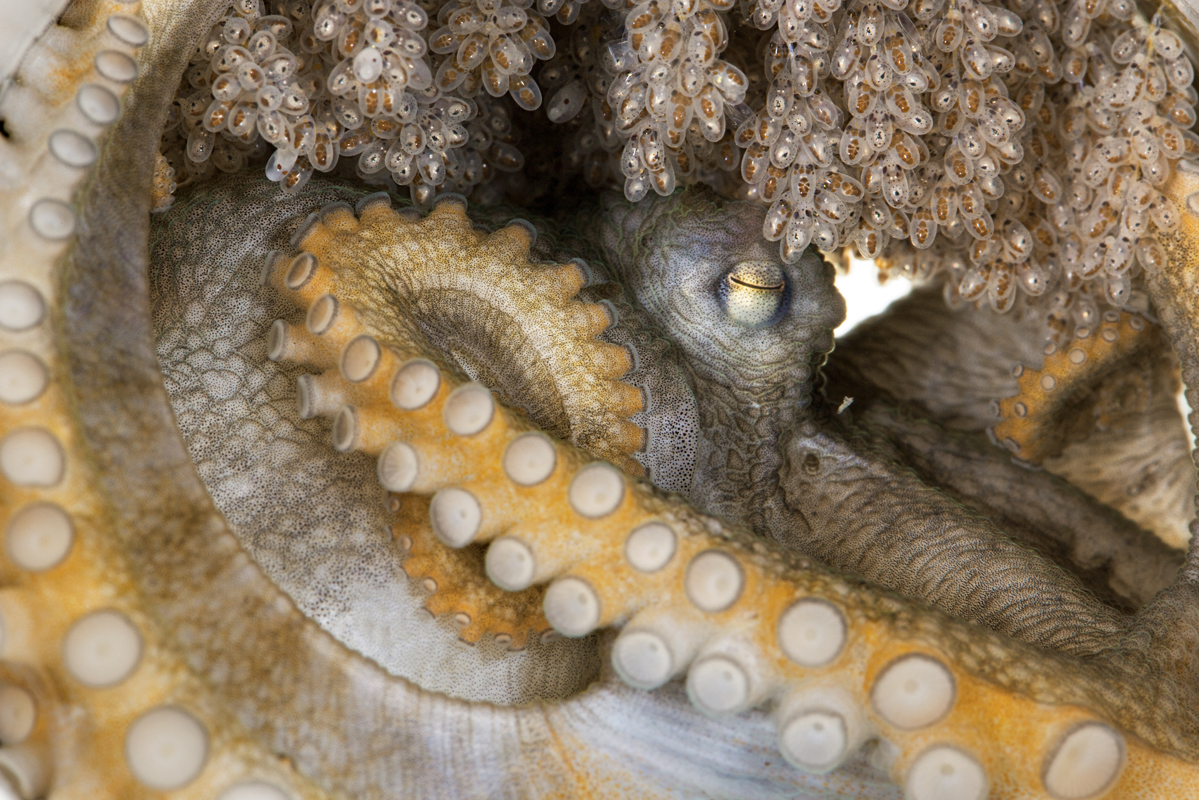
A female octopus with eggs. image source
This behavior occurs at the genetic level. After fertilization, the female body simply stops producing digestive enzymes, the females are not able to digest any food.
The male dies even earlier, in most cases the female devours him after mating (as mantis and spiders). By the way, all octopuses are cannibals by nature and like to eat smaller and weaker relatives.
Cannibalism eliminates the possibility of social interaction. Although in theory, they could use their ability to change color as a way of communication. The presence of social structure could give a powerful impetus to the development of the Central brain, in addition to the now available powerful nervous system.
Some fantasy in conclusion
Imagine what octopuses could achieve with at least the level of social communication like dolphins, and passing knowledge from generation to generation. The oceans provide enough funds for the development of a high-tech race.
Underwater volcanoes, the tides, the sun, waves and wind can serve as sources of energy. A huge number of minerals: oil, gas, metals, sand, coal, gravel. Bioengineering - the construction of complex structures using controlled growth of coral polyps. Lighting using bioluminescent organisms. The production of oxygen and hydrogen through hydrolysis of water, as fuel components. And all this under the control of beings which perceive the surrounding space more finely than we.
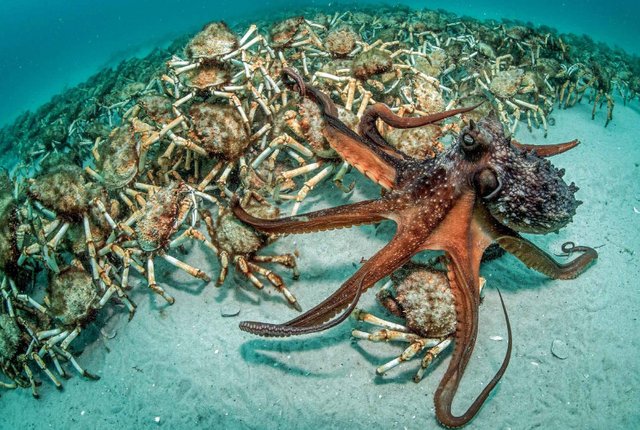
Octopus prepares an army of crabs for an attack on humanity. image source
If we agree that octopuses are reasonable, then it is worth noting, that in contrast to other highly developed animals, our kinship with them is minimal. In fact, evolution has invented a developed mind for the unique body twice. And maybe, on distant exoplanets, the surface of which is completely covered by oceans hundreds of kilometers deep, the octopus-like creatures are preparing their spaceships to meet with us one day...
sources: 8 reasons why octopuses are the geniuses of the ocean, Octopus shows unique hunting, social and sexual behavior, The Octopus Visual System, Octopus: The Ocean's Intelligent Invertebrate, The high intelligence of the octopus, Octopus for dummies, The octopus is a secret genius, Dogs high neuron density among carnivores, Intelligent cephalopods, NatGeo The geniuses of the ocean, A second site occupied by Octopus tetricus at high densities, with notes on their ecology and behavior, images from Google Search.

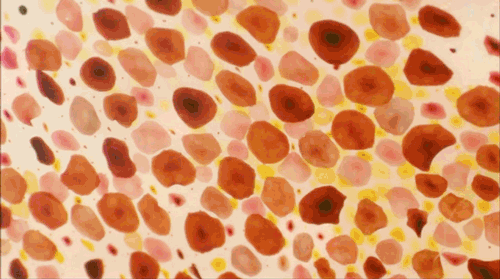
Holy hell, this is one of the best posts I've seen in a LONG time .. awesome, i've never even thought about how its heart and stomach is inside its head, so to speak. Resteem / New Follower !! PEACE OUT !! marine life rules !!
Thanks, I'm flattered by your words. Octopuses are really amazing, that's why I wrote about them such a detailed article. A few days ago I had no idea what what they can do.
Follow you too ;)
yeah, terrific post @natord, I've known for a while now how intelligent octopi are, but you still managed to add a few extra points that I wasn't aware of as well (such as the triple hearts, the similarity of their eyes to humans, and the "consciousness" of their severed limbs), so thank you for that.
Also, that clip of the octopus reaching out to the one who saved him was touchingly priceless! :)
I am very glad that you learned something new, that's mean I wrote this post not in vain ;)
it most certainly was not! lol :)
"Each of these suckers can also move independently from the others" was it an attentional pun ? :P Very good article by the way ! Great Science and humor combos.
Fantastic post, thanks to @transisto for sharing it.
The octopus is quite possibly the most fascinating creature on Earth. Thank you for a great read.
Thank you for reading!
Octopus are amazing creatures and not just fascinating but very nice to look at during a dive in the ocean :) Unfortunately I just saw them hidden in their caves so far and none moving around :/
Well, in any case, you are lucky to see them in their natural habitat. I have seen only small cuttlefish :)
That's very true :) I haven't seen any cuttlefish yet though :D
This article is very detailed and informative... Awesome
Well, I spent a lot of time to collect data. Thank you for reading!
Keep it up bro... Nice one
I just followed you, I'll be happy if you can follow back
Wowza!! EXCELLENT POST!!! Now I love octopuses even MORE!!!!
Now this is my totem animal! :)
Bow to your Octopus Overlords!
Just kidding. Thanks for sharing this great post. I scuba dive occasionally and Octopus is at the top of the list of creatures I like to see. They are so very tough to spot though given the camouflage that you mentioned.
Reading your post made me wonder how they coordinate 8 legs. Do they have some that are more capable than others like handedness in humans? Just wondering.
Well, as I pointed out in the article, in fact, the hands themselves are coordinated. With such a control system I think they don't have lefties and righties. Besides their Central brain doesn't have the left and right hemispheres.
But, it is possible that more of the octopus prefer to use the anterior and lateral arms, because they are directly in his field of vision, while the hind arms perform function of mounting.
Ah, thanks. I should have caught that from the article. Without hemispheres it wouldn't make sense.
It was good question anyway, thank you :)
Wow pretty sophisticated creature and I fear them more than sharks 😊
wtf... i think i'm going to cancel that spring scuba class
Very Educative article
Thank you.
Wonderful publication thank you
Thank you that spend your time for reading!